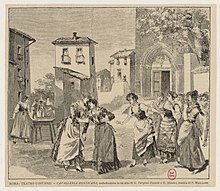Cavalleria Rusticana
| Cavalleria rusticana | |
|---|---|
| Opera by Pietro Mascagni | |

Scene from the world premiere of the opera
|
|
| Librettist | Giovanni Targioni-Tozzetti and Guido Menasci |
| Language | Italian |
| Premiere | 17 May 1890 Teatro Costanzi, Rome |
Cavalleria rusticana (pronounced [kavalleˈriːa rustiˈkaːna]; Italian for "rustic chivalry") is an opera in one act by Pietro Mascagni to an Italian libretto by Giovanni Targioni-Tozzetti and Guido Menasci, adapted from a play and short story written by Giovanni Verga. Considered one of the classic verismo operas, it premiered on 17 May 1890 at the Teatro Costanzi in Rome. Since 1893, it has often been performed in a so-called Cav/Pag double-bill with Pagliacci by Ruggero Leoncavallo.
In July 1888 the Milanese music publisher Edoardo Sonzogno announced a competition open to all young Italian composers who had not yet had an opera performed on stage. They were invited to submit a one-act opera, which would be judged by a jury of five prominent Italian critics and composers. The best three would be staged in Rome at Sonzogno's expense.
Mascagni heard about the competition only two months before the closing date and asked his friend Giovanni Targioni-Tozzetti, a poet and professor of literature at the Italian Royal Naval Academy in Livorno, to provide a libretto. Targioni-Tozzetti chose Cavalleria rusticana, a popular short story (and play) by Giovanni Verga, as the basis for the opera. He and his colleague Guido Menasci set about composing the libretto, sending it to Mascagni in fragments, sometimes only a few verses at a time on the back of a postcard. The opera was finally submitted on the last day that entries would be accepted. In all, 73 operas were submitted, and on 5 March 1890, the judges selected the final three: Niccola Spinelli's Labilia, Vincenzo Ferroni's Rudello, and Mascagni's Cavalleria rusticana.
...
Wikipedia
